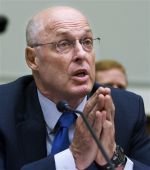 I’m a conservative and a strong believer in free markets because it stokes competition, which benefits the consumer in the way of lower prices for goods and services, and ultimately creates a greater level of wealth for the majority in a society. I believe corporations should be free to compete and prosper with as little government intervention as possible. I am not for Obama’s economic plan of redistributing wealth like Robinhood, taking from the rich and giving their money to the rest of us (who are in relation to their bags of money, poor). What I’m talking about here economically is not taxes or income redistribution, but checks and balances within an economy to ensure that those on top don’t make decisions that injure the lives of thousands of people. How is that best achieved in light of man’s sinfulness and tendency toward greed?
I’m a conservative and a strong believer in free markets because it stokes competition, which benefits the consumer in the way of lower prices for goods and services, and ultimately creates a greater level of wealth for the majority in a society. I believe corporations should be free to compete and prosper with as little government intervention as possible. I am not for Obama’s economic plan of redistributing wealth like Robinhood, taking from the rich and giving their money to the rest of us (who are in relation to their bags of money, poor). What I’m talking about here economically is not taxes or income redistribution, but checks and balances within an economy to ensure that those on top don’t make decisions that injure the lives of thousands of people. How is that best achieved in light of man’s sinfulness and tendency toward greed?
As we’ve seen in recent weeks and building up over the past decade, unregulated free markets without proper checks and balances can spin out of control and cause entire corporations and even some sectors of the economy to collapse (or face the prospect of it) and hurt thousands or possibly millions of people in its devastating wake.
So what is the proper approach? Totally unfettered, unregulated free markets? Fully regulated markets? Or free markets with minimal but necessary regulation so as to keep corruption from occurring, with the people’s interests in mind?
I’m not proposing I know any one air tight argument. I’m simply throwing these ideas out there as a way to ponder the prospect that free markets, without checks and balances, is a risky deal for an economy and it can actually become a national security issue. Think Enron, WorldCom, and recently Lehman Brothers, Countrywide, and a host of other giant companies that have failed, where thousands of employees lost jobs due to corruption and bad, unethical, immoral choices, and millions of people financially injured as a result. And with a bad economy, you don’t have capital to keep the country safe from those who are bent on harming us.
Just as we need checks and balances in the political sphere (the very way in which our country was established), so also in the corporate sphere, this seems to be something that may need to be required. Free market capitalism, as great as it has been has a down side: sinners run it. Sinners become greedy for money, for power, ruthless, self-centered, envious, etc. With that fundamental principle in mind, based on a proper assessment of the history of what sinners are capable of when in power, our founding fathers framed the Constitution and arranged the government in such a way that it checks itself against error and corruption in order to preserve freedom.
Could it be we need something similar within the economy? Not checks on how rich people get, but more about the business decisions that are made. I’m simply proposing the idea, I’m not set on it. But people are getting hurt out there by fat cats sitting pretty, obtaining a lot of cash through greed and immoral decisions at the expense of a majority of people down on the totem pole. That’s just straight up immoral.
Now too much regulation is a bad thing. That’s where the former USSR comes in. That is where the government owns companies and tells them what they should and shouldn’t be doing in every way. That is one of the most inefficient ways to run goods and services for a society, and ultimately the system crumbles apart altogether, or stays like Cuba.
But no regulation at all? That’s what pure free marketers want. Yet a totally unregulated market can actually allow businesses to become the very oppressive, greedy, reckless entities many of these same people oppose in a government because of human sinfulness. Corporations are now the size of small governments, economically speaking. There is a lot of room for the same excess and error on the same scale as that of a corrupt government in some cases. Granted, less issues arise than other economic systems, but the potential is there for really big problems to affect a large majority of people. And not only is there potential, there has been a real situation where this very thing has actually happened.
Historically, what framers of economic theory in the past would have seen corporations growing to the size of many governments? There are factors we must take into account that those in the past couldn’t even have foreseen. Am I talking about the government running companies? No. Again, checks and balances. How does that work? I don’t really know to be honest, I’m just brainstorming more than anything. But if we are to believe that man is dreadfully sinful, to be consistent, it seems we should apply that same understanding to capitalism, should we not? Should we keep our government in check while not keeping our economy in check? I don’t know, just an idea.
So where’s the line drawn between unregulated and fully regulated markets? Honestly, I’m thinking it’s kind of a gray area more and more, though I have been pretty adamant about pure, 100% free markets until recently. And I also believe that it may depend on the sector of the economy and not just an all or nothing kind of thing. I’m still formulating my thoughts on this and nothing is very cohesive yet as to my opinion only because these are recent thoughts I’ve had in light of this economic crisis. But events over the past decade, particularly recently, have really made me question pure capitalism without any government regulation or oversight.
There has been another issue that has come to light in my mind that further shows where the government may be needed to step in: network neutrality.
As a worker in the IT world, as with people in other lines of work, I know things that workers outside of my field do not know. I have an inside look I guess you could say. I see and understand things that others find an enigma, just as I find Greek and Hebrew to be an enigma and rely on scholars and theologians to help me understand what Scripture, in the original text, is saying. (Not saying I’m the equivalent of a scholar in the IT field). I would never presume that I know or fully comprehend the Greek language unless I had studied it to some degree or another. I’m not boasting, or saying I’m great because I know IT and others don’t, so don’t take me the wrong way. Nor am I saying I know everything pertaining to my field, for I only know an inkling. I’m making a point to say that sometimes others talk as if they are in the same line of work as someone else when in reality they have no idea what they are talking about.
And that brings me to net neutrality. The fundamental way to explain this is to say that ISP’s (or internet services providers, e.g. Charter, AT&T, Time Warner, Comcast, etc.) are increasingly working to limit what you can and cannot view and what services you can and cannot use for their own profit (i.e. you would pay more to get more services, versus the current model where internet access is open for all services). Now the free market in me wants to say that companies should be allowed to gain from their business dealings, no matter what.
However, what happens when a company seeks to stop certain services from being utilized by a consumer? Well, fine, switch internet providers then, right? But what happens when you don’t have access but to only one provider? And what happens when all of them are doing the same blocking and stifling the use of a potentially great service or protocol that you can’t use now? And even further, what if those services could be used by developers for further innovation and progress in the realm of internet services?
Net neutrality would be law that forces ISP’s to leave the internet network services open, mandating they not interfere with the accessibility of certain protocols and services developed for the internet (that’s about as simple as I can explain it; I would get technical, but that’s outside the scope of what I’m saying). In my view, this would actually promote competition and keep the ISP’s personal interests at bay for the sake of the consumer. A free and unfettered internet (through legislation) would actually promote innovation and competition with other services. Free marketers cry out that this is just smoke and mirrors for government censorship of certain sites, yet it really is the opposite: it’s keeping the internet open from the likes of the medium you access it through, your ISP, and locking down what you can and can’t do. You see, once again, if net neutrality doesn’t pass, instead of the government having control over what you do (the fear of pure free marketers), the corporations do instead. How about the government checking companies to make sure they are not stifling communication and innovation?
I point that out to say that sometimes, in order to preserve freedom, the government may need to step in to keep the people responsible for your access from blocking the very consumers and citizens they are bringing a service to. Am I wrong? Maybe. I’ve only recently started thinking through all of this and wouldn’t mind some input. But sometimes, like in the financial sector and the tech sector (specifically internet access) government regulation can be a good thing and help the citizens. However, at the same time, it can be a bad thing if it’s too much.
So ultimately I’m coming to the idea we may need checks and balances in our economic system to maintain a prosperous and growing economy that keeps executives from making reckless decisions as well as stifling innovation and technological progress.

 A friend of mine posted this link under an item I posted recently on Facebook and so I thought it was pertinent to read in itself. It seems secular marketers have moved more and more into the Christian publishing market, and as a result, we are receiving what we “want” to read based on statistical analysis, not necessarily what we need to be reading as believers. We need to take it back for the glory of God, not the glory of profit.
A friend of mine posted this link under an item I posted recently on Facebook and so I thought it was pertinent to read in itself. It seems secular marketers have moved more and more into the Christian publishing market, and as a result, we are receiving what we “want” to read based on statistical analysis, not necessarily what we need to be reading as believers. We need to take it back for the glory of God, not the glory of profit.  I’m a conservative and a strong believer in free markets because it stokes competition, which benefits the consumer in the way of lower prices for goods and services, and ultimately creates a greater level of wealth for the majority in a society. I believe corporations should be free to compete and prosper with as little government intervention as possible. I am not for Obama’s economic plan of redistributing wealth like Robinhood, taking from the rich and giving their money to the rest of us (who are in relation to their bags of money, poor). What I’m talking about here economically is not taxes or income redistribution, but checks and balances within an economy to ensure that those on top don’t make decisions that injure the lives of thousands of people. How is that best achieved in light of man’s sinfulness and tendency toward greed?
I’m a conservative and a strong believer in free markets because it stokes competition, which benefits the consumer in the way of lower prices for goods and services, and ultimately creates a greater level of wealth for the majority in a society. I believe corporations should be free to compete and prosper with as little government intervention as possible. I am not for Obama’s economic plan of redistributing wealth like Robinhood, taking from the rich and giving their money to the rest of us (who are in relation to their bags of money, poor). What I’m talking about here economically is not taxes or income redistribution, but checks and balances within an economy to ensure that those on top don’t make decisions that injure the lives of thousands of people. How is that best achieved in light of man’s sinfulness and tendency toward greed? The problem I have with the Fannie and Freddie debacle is not so much the quick-fix, economic rescue of these massive, government-backed organizations announced this weekend, using billions of dollars of our tax money to bail them out. I believe that was inevitable given the structure of how they were setup to begin with and the level of the housing market they hold. But rather the root problem for me lies in the fact that they were ever created to start with. Their rescue was simply the place this whole thing had to end up.
The problem I have with the Fannie and Freddie debacle is not so much the quick-fix, economic rescue of these massive, government-backed organizations announced this weekend, using billions of dollars of our tax money to bail them out. I believe that was inevitable given the structure of how they were setup to begin with and the level of the housing market they hold. But rather the root problem for me lies in the fact that they were ever created to start with. Their rescue was simply the place this whole thing had to end up. “Let’s get this software out as fast as possible without setting up the proper infrastructure and implementing a stable design,” seems to be the motto for giant proprietary software vendors like Microsoft, in light of Vista’s implementation upheaval.
“Let’s get this software out as fast as possible without setting up the proper infrastructure and implementing a stable design,” seems to be the motto for giant proprietary software vendors like Microsoft, in light of Vista’s implementation upheaval. “When in doubt, the government will bail you out.” That seems to be a motto that is increasing in our society. And now it seems to have moved into our national government’s thinking as well. $300 Billion have now been approved by the Senate to bail people out of houses they couldn’t afford to start with. From the wise financial decisions of house-hungry consumers who enviously want to live in uptown Wherever, coupled with the deceitful financial practices of lenders approving loans they know the customer cannot afford based upon a simple formula (called the debt-to-income ratio), this mess has now resulted.
“When in doubt, the government will bail you out.” That seems to be a motto that is increasing in our society. And now it seems to have moved into our national government’s thinking as well. $300 Billion have now been approved by the Senate to bail people out of houses they couldn’t afford to start with. From the wise financial decisions of house-hungry consumers who enviously want to live in uptown Wherever, coupled with the deceitful financial practices of lenders approving loans they know the customer cannot afford based upon a simple formula (called the debt-to-income ratio), this mess has now resulted. Many from conservative and liberal camps are proposing two different ideas for our current energy conundrum: we either need to (from the conservative camp primarily) increase our domestic drilling and current output, or we need to (from the liberal camp primarily) create new sources of renewable energy so that we can become less dependent upon foreign oil, decrease “greenhouse gases,” and overall lower pollution (which I’m all for getting rid of nasty fumes, by the way).
Many from conservative and liberal camps are proposing two different ideas for our current energy conundrum: we either need to (from the conservative camp primarily) increase our domestic drilling and current output, or we need to (from the liberal camp primarily) create new sources of renewable energy so that we can become less dependent upon foreign oil, decrease “greenhouse gases,” and overall lower pollution (which I’m all for getting rid of nasty fumes, by the way).
R.C. Sproul on the Redistribution of Wealth, Voting and Christianity
By David Westerfield
On October 30, 2008
In Business, Christian Culture, Culture, Economics, Politics, Theology
It is, of course, the American way. But we Christians should not be involved in that sort of thing. Rather we should be voting for what is right, what is ethical. And our consciences on that score need to be informed by the Word of God, not by our wallets. And so I plead with you: When you enter the voting booth, don’t leave your Christianity in the parking lot. And be bold to speak on these issues, even if it means somebody picks up a rock and throws it in your head. Because it is through tribulation that we enter the Kingdom of God. I pray for you, beloved, and for our nation in these days to come.”
Taken from this excellent article: http://www.ligonier.org/blog/2008/10/pr … -text.html